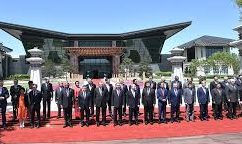U.N. Peace Talks Delayed by Opposing Factions
By Felipe Bueno
Staff Writer
Four years ago the United States, Russia, and regional powers united behind the call for a coalition in order to alleviate the conflict taking place in Syria. The coalition was to be based on a formula conceived in Geneva and endorsed by a U.N. Security Council resolution which took place in December, promising green grass and blue skies for the diplomatic endeavor. Four years after this diplomatic movement more than 250,000 people have been killed, over 5 million refugees have been displaced from their homes, and countless war crimes have been committed. As reported by The New York Times, airstrikes have damaged schools and hospitals, and the government has denied entry to the World Health Organization in order to treat malnourished children.
Clearly these peace initiatives have failed in the past, as evident by Syria in its present state. Now that the war has escalated, the effectiveness of the current peace process in undoubtedly in question. The current slew of peace efforts is not by any means a new or inventive method, and for the third time in four years The U.N. Security Council, with the help and support of world powers, adopted a resolution to end the killings in Syria. As the U.N. has stated, the purpose of these “Vienna Statements” is to be the basis for “a Syrian-led, Syrian-owned, political transition to end the conflict.” Furthermore, “The Syrian people will decide the future of Syria,” and the way to provide Syrian-led change is to persuade warring parties in Syria to come to Switzerland and participate in a discussion on how best to end the current killings.
Ideally, the factions will visit Geneva, where Staffan de Mistura, the U.N.’s special envoy for Syria, will host what he called “proximity” talks. These talks are organized so that the factions present are never in the same room. Instead, dialogue will be shuttled back and forth by Mr. de Mistura as a way to relieve tension and avoid violence, as reported by The Washington Post. The talks will then take place over 6 months. While the “proximity” talks seemed like a reasonable plan, tension and disagreements erupted without the talks ever taking place. The main issue which caused the tension began with the issue of who should be invited to attend the delegation. Russia objected to including the Islamist Jasih al-Islam faction, which Russia has labeled a terrorist group. Additionally, Moscow wants to include the Kurdish People’s Democratic Party because the Kurds are fighting as well. However, Turkey has stated that it would withdraw its support if the Kurds are included. The issues seem to be deviating away from Syria itself, and countries have become focused on who has claimed to offer substantial support, and their own political agendas. The news of these talks have done nothing to lessen the fighting, offering the opposite as tensions have intensified with the drawing of the talks.

